History
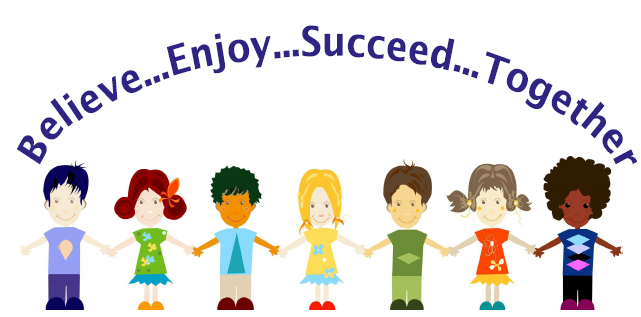
At Cronton CE Primary School our KEYS Curriculum is built around the National Curriculum, enriched to reflect the children and community we teach in. As a church school our Christian ethos and school values are the heart of everything we do.
We believe every child can be their BEST with our Vision statement reflecting this.
“I can do everything through God who gives me strength” Philippians 4:13
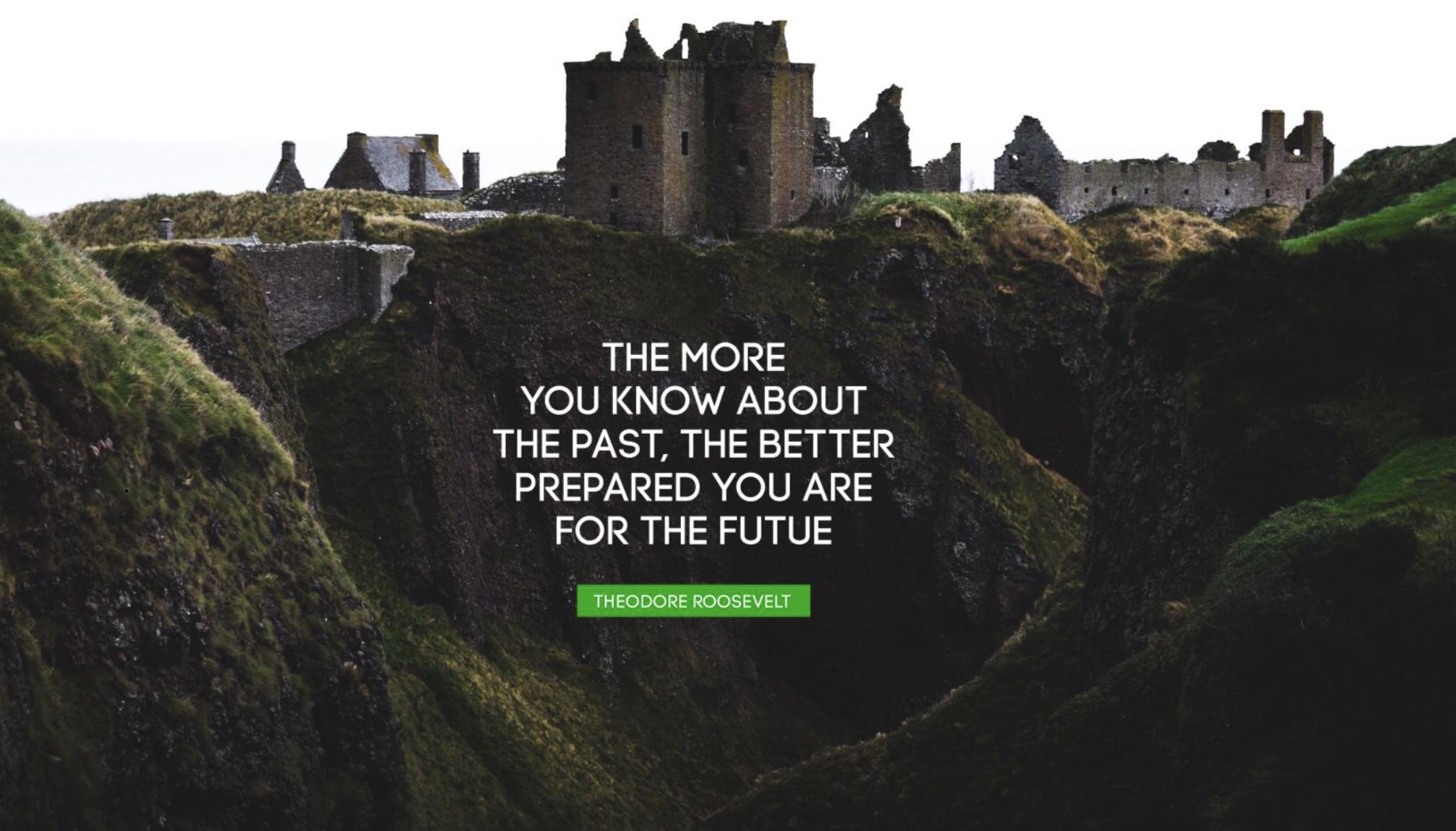
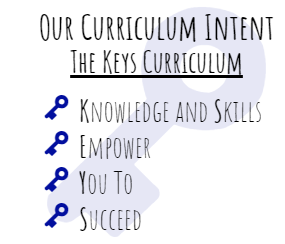
How history links with our KEYS curriculum
As the quote below says we believe learning about significant legacies, aspects and concepts of history worldwide, nationally and locally will help equip our children to become Global citizens of the future. Through history they will develop many transferable skills, enabling them to make connections and contrasts, ask questions and build their independence by creating and presenting their own structured accounts.
Key attributes of our Historians at Cronton CE
Children will gain a curiosity about the past and their ancestors.
- They will gain a wide historical vocabulary and be able to use this to discuss past events, people and eras.
- They will have chronological knowledge of British History and how this relates to the wider world.
- They will have a knowledge and understanding of their community through studying the local area.
- They will develop independence in their work by choosing their own ways to present findings.
- They will develop a better understanding about faith and spirituality, through learning about the importance of this in different time periods.
- They will develop respect for past civilisations, through finding out about the challenges they faced.
- They will be able to make connections about social, cultural and technological aspects of everyday life and legacies from different time periods.
- They will learn the importance of persevering when trying new things through learning about past inventions.
- They will learning about democracy, law and Justice understanding how civilisations and countries have been governed in different time periods.
Intent
The main aims of our History curriculum at Cronton C.E. are:
- To gain a chronological knowledge of Britain's past and that of the wider world.
- To develop a knowledge of how the past has had an influence on present life.
- To gain a knowledge of the past within the local areas of Cronton, Widnes and Liverpool.
- To inspire children's curiosity to know more about the past by developing skills to carry out historical enquiries by asking questions, thinking critically and examining artefacts and evidence.
- For our children to be able to discuss significant historical events and people and to be able to compare lifestyles from different eras.
- Children will gain a knowledge and understanding of a wide range of historical vocabulary and be able to use it appropriately.
Have a look at some of our children building houses like a person from the Stone Age!
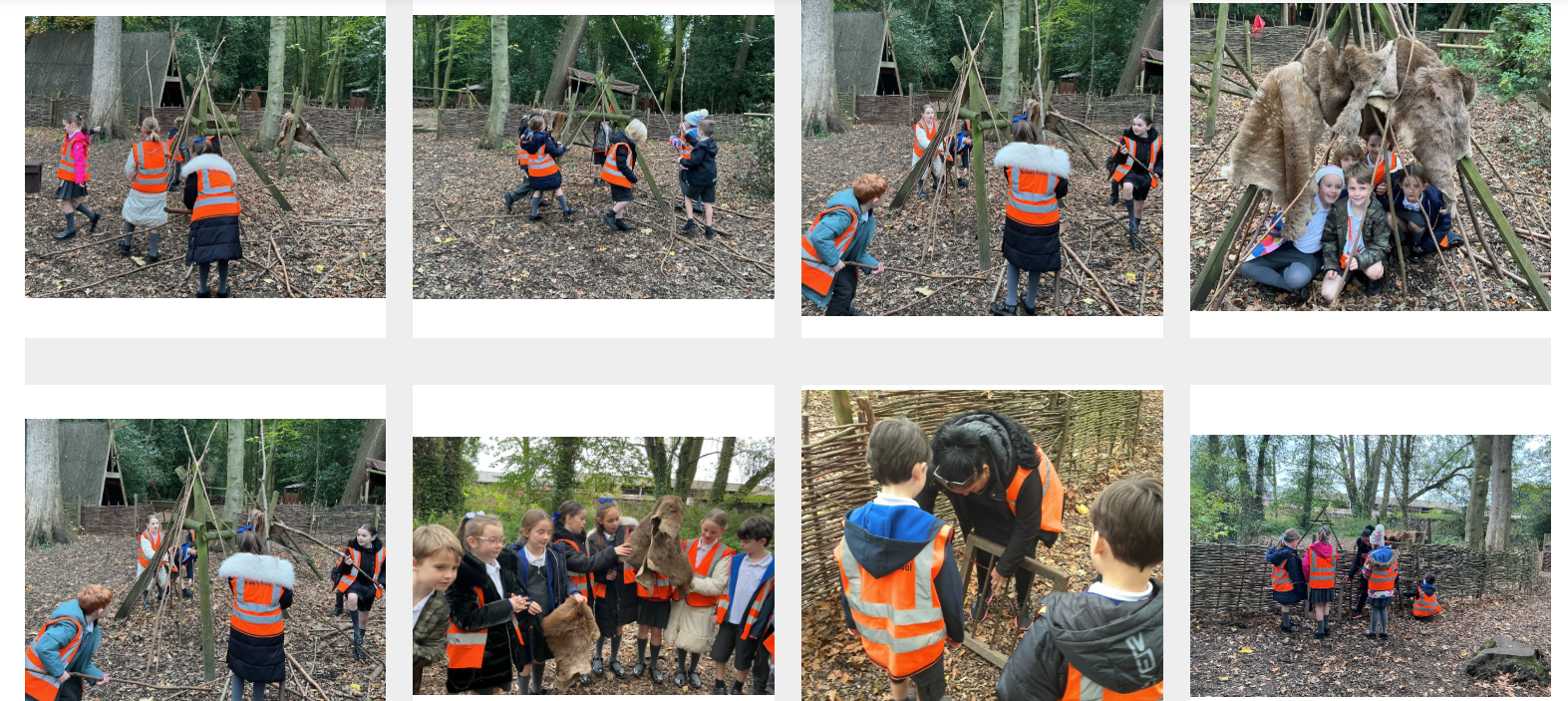
Implementation
In KS 1 classes study significant people and events and aspects of change over time. In KS2 the curriculum is mapped out broadly chronologically with each KS2 class studying an ancient era as well as a period of British history. Each year group also studies an aspect of local history. In KS1 these link in with local important events and local significant people and in KS2 children learn about the local area starting with the immediate vicinity of our school and village in Y3 with Cronton, and leading out to the city of Liverpool in Y6.
The curriculum has been designed so that there are opportunities for children to revisit prior learning and make links and comparisons across different eras. They will learn about the social and cultural aspects from different time periods as well the importance of faith. They will find out about significant figures, rulers and leaders and discover how conflicts and invasions have shaped and defined eras.
Lessons have been designed to ensure that the children develop vocabulary , knowledge and skills within the history curriculum. Children will find out about the legacy of different eras and events, learning how the past has affected present life.
We have a variety of artefacts and sources to develop and enhance learning. We also have a large scale timeline which allows children to place the period studied into chronological contact.
Rulers, Leaders and Key Figures
Spirituality
Democracy, Law and Justice
War, Conflict and Invasion
Settlement and Trade
These aspects and themes run throughout our curriculum and are covered in different ways across various topics enabling children to build their knowledge and understanding of these concepts across different time periods.
Legacy – understanding of how the past has affected the present will be studied in all topics
Rulers , leaders and key figures – understanding of how rulers, leaders and important figures have shaped the present
Democracy, law and Justice – understanding how civilisations and countries have been governed in different time periods.
Spirituality – importance of faith in different time periods, including how countries have differing belief systems and how these have developed
War, conflict and invasion – understanding of the importance of war, conflict and invasions in shaping and defining different time periods
Settlement and trade an overview of social, cultural and technological aspects of everyday life including clothes, food, homes and leisure and the impact of trade on this
Children are encouraged to think like an historian by learning about these disciplines:
chronology, using sources as evidence to construct and interpret history, making comparisons and learning about the significance and legacy of historical events. Here are progressive sequencing road maps of these disciplines.
Using Sources as Evidence
Comparisons
Significance
Lesson Structure

This lesson structure has been designed to ensure the children learn more and remember, combining recapping with learning new knowledge and allowing children to make links across time periods. They will develop an understanding of chronology and learn historical vocabulary. They will be able to use enquiry skills to learn about the past and be able to present their knowledge and findings in a variety of ways.

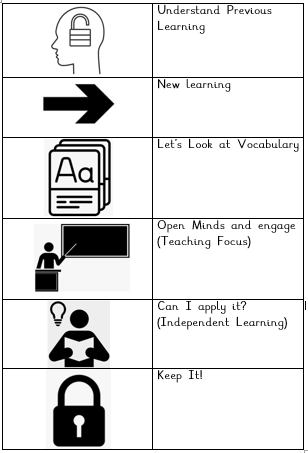
Documents
Policy
Progression skills
Vocabulary
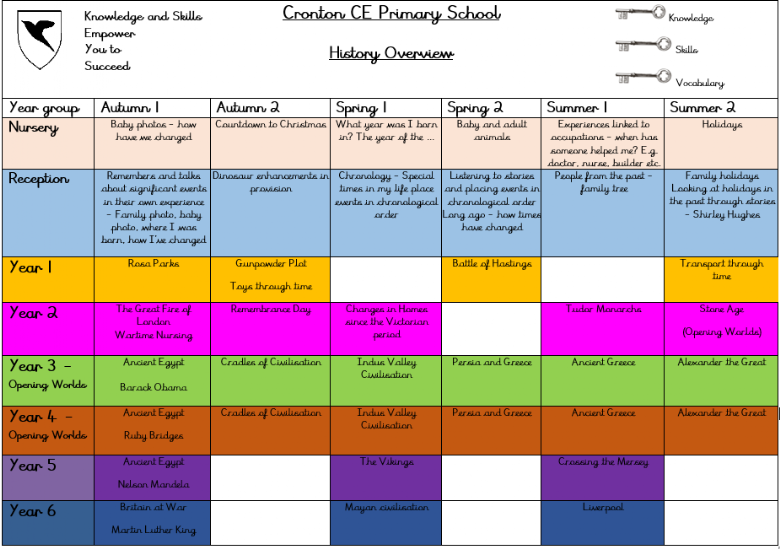
Curriculum
EYFS
In EYFS children will learn about themselves and their families and begin recognise similarities and differences within their lives and their friends in many situations such as homes, customs and family make up. They think about changes within in their life learning about how they have grown and comparing past with present. They begin to make sense and think about their place in the wider world, learning about the uniqueness of individuals through discussing other faiths, religions, cultures and countries.
They will begin to learn about history through participation of traditions and specific days such as Saints days, Remembrance Day and Bonfire Night. They will find out about historical figures through books, both fiction and non fiction and they will begin to learn about things that happened before they were born and using family members as sources.
Children will be encouraged to use common time related words when retelling their news enabling them to begin to sequence events they have experienced, as well as pictures or events from stories. They will experiences many traditional tales and Nursey Rhymes, learning that these have been retold over many years.
Using their natural curiosity of dinosaurs as a basis, children will learn about pre history , learning about the role of archaeologists in our knowledge and interpretation of the past.
Year 1
They build on their understanding gained in EYFS that they are similar to others but everyone is unique learn and they about Rosa Parks in Black history month and start their knowledge of historical inequality of black rights They know that some people treat (treated) others in ways that are not kind because of the way the look.
As part of the Gunpowder plot topic, they will learn to recognise The Houses of Parliament and why they are important to us today. They will learn about the events associated with the Gunpowder Plot and understand why we celebrate bonfire night.
When they study ‘Toys through time’, children will discover what a timeline is and how it can be used to show chronology. They will then be able to make comparisons between how their toys are played with similar or different to a different generation.
In the Spring term during their history topic, children will learn about our monarchy today and how a new monarch is selected, when the current ruler dies. They will then learn about the events related to the Battle of Hastings and how this led to the building of many castles in England. They will learn about life in a Norman castle which will be enhanced by a visit to Beeston Castle.
In the Summer term, children will continue to develop their understanding of timelines through the topic 'Transport Through Time.' They will compare how different types of transport has changed over the past 100 years. They will also learn about how a local event, the Rainhill Trials, was of significant national importance. They will look again at the importance of local rail links in KS2 in relation to trade.
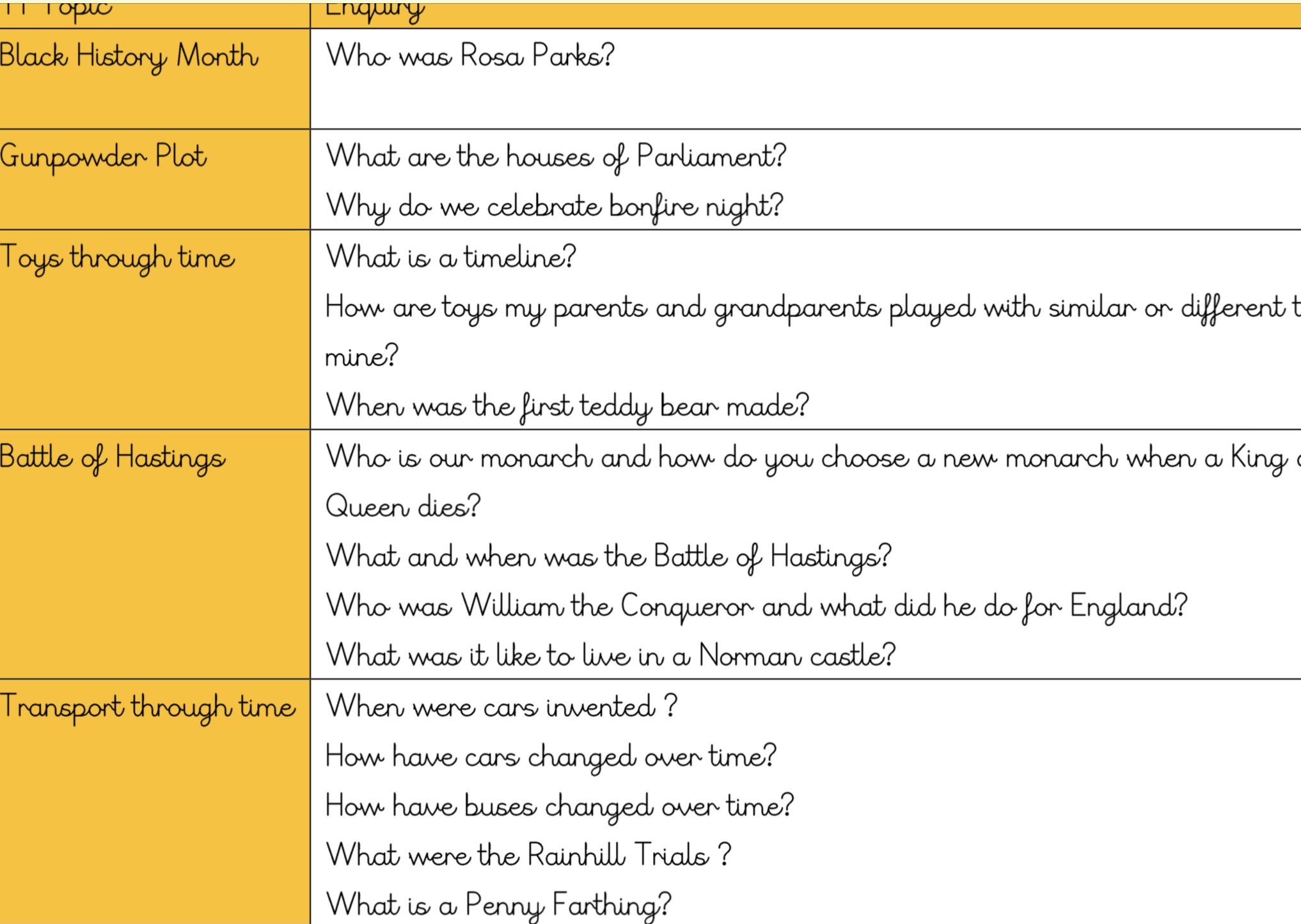
Year 2
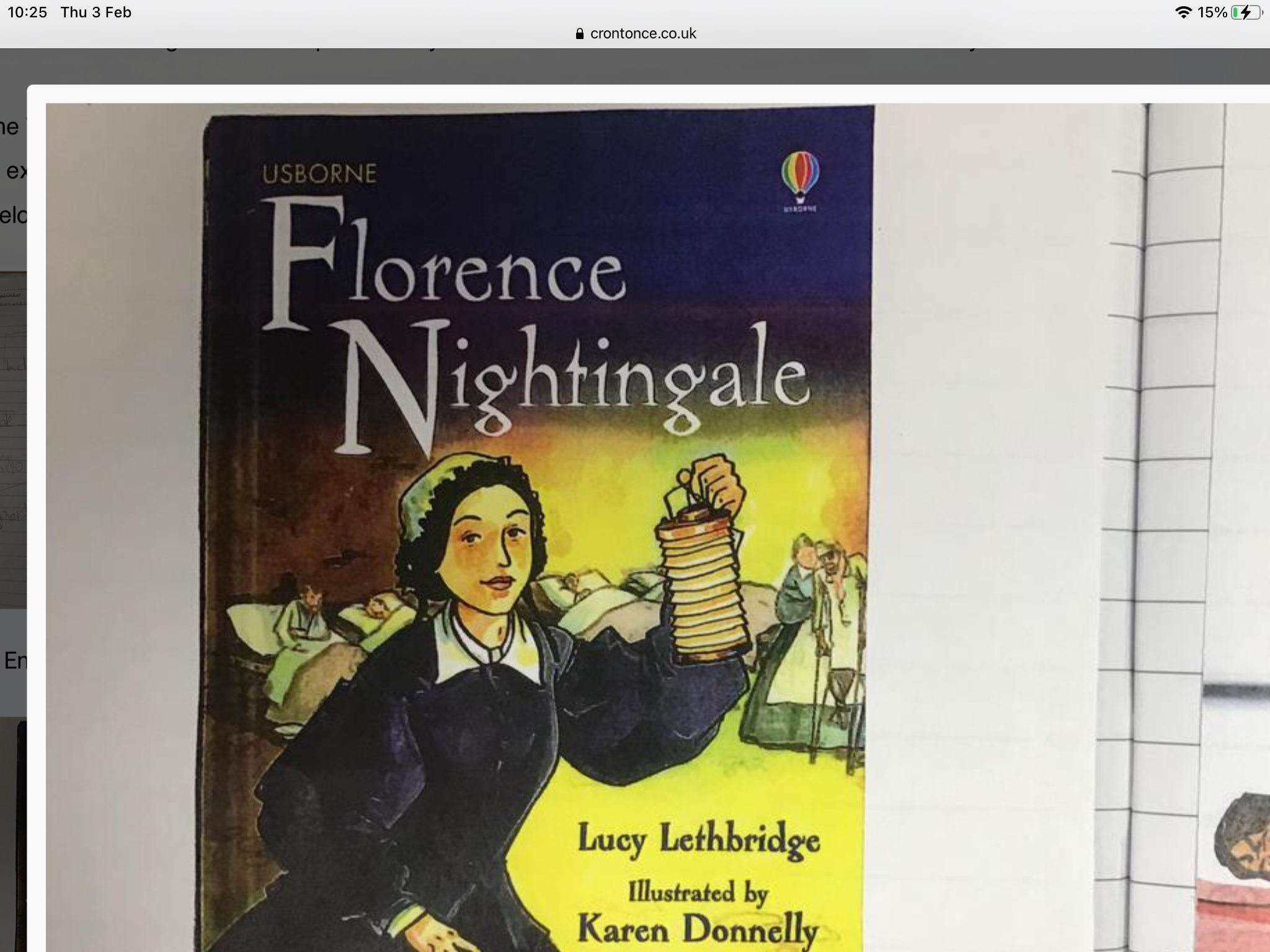 As part of Black History Month Year 2 children will learn about the life of Mary Seacole and compare it with that of Florence Nightingale, in the Wartime Nursing topic. Our English text has enabled a cross curricular learning.
As part of Black History Month Year 2 children will learn about the life of Mary Seacole and compare it with that of Florence Nightingale, in the Wartime Nursing topic. Our English text has enabled a cross curricular learning.
They will learn about the events Great Fire of London and what lessons we learnt from it, comparing aspects of buildings and homes from then with now. We will find out about two famous people from this time, Samuel Pepys and Sir Christopher Wren.
In November children will gain an understanding of the significance of Remembrance Day and some of the traditional ways in which we commemorate it.
Following on from previously learning about how homes and houses have changed since the Fire of London, the children will go on to further study changes in homes. This time comparing houses today to those in the Victorian era. They will use artefacts to compare household appliances with today and learn how inventions and discoveries from that time have affected us today. Children will learn about the life of a significant local person Kitty Wilkinson and the affect she has had on life today.
In the Tudor Monarch topic children will be able to recap on their knowledge of the English monarchs they have already learnt about and extend this by finding out about some of the Tudor monarchs. They will continue to develop their use of timelines and begin to develop their understanding of chronology.
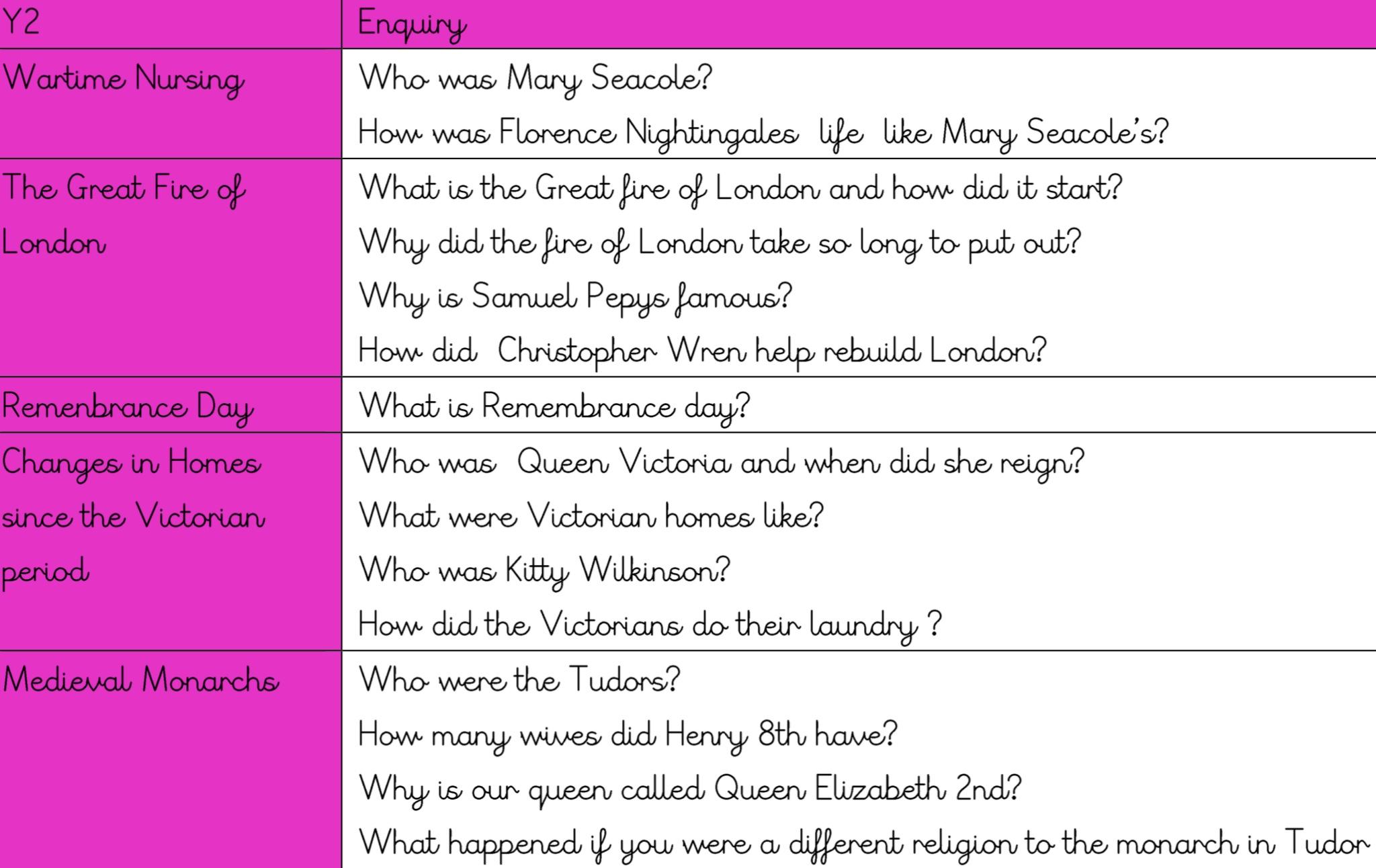
Year 3
As part of Black History Month children will find out about the life of Barack Obama and his importance in modern society.
In Year three children start their chronological journey of English History by learning about the earliest civilisations through the topic ‘Different Ages’. They discover what life was like in Stone Age, Bronze Age and Iron Age Britain, comparing similarities and differences in aspects of prehistoric daily life and settlements from these different periods.
In the Spring Term children continue their chronological knowledge of British History by learning about the Roman Invasion and subsequent Romanisation of Britain. Children learn about life at that time as well as the legacy the Romans have had on us today. A highlight of this topic for the children is a visit to Chester to enrich their learning.
In the summer term children develop their knowledge of our local history by finding out about our village, Cronton. Children discover how aspects of the villages past life such as worship, employment, trade and schooling are still evident today, as well as finding out about the significance of local landmarks.
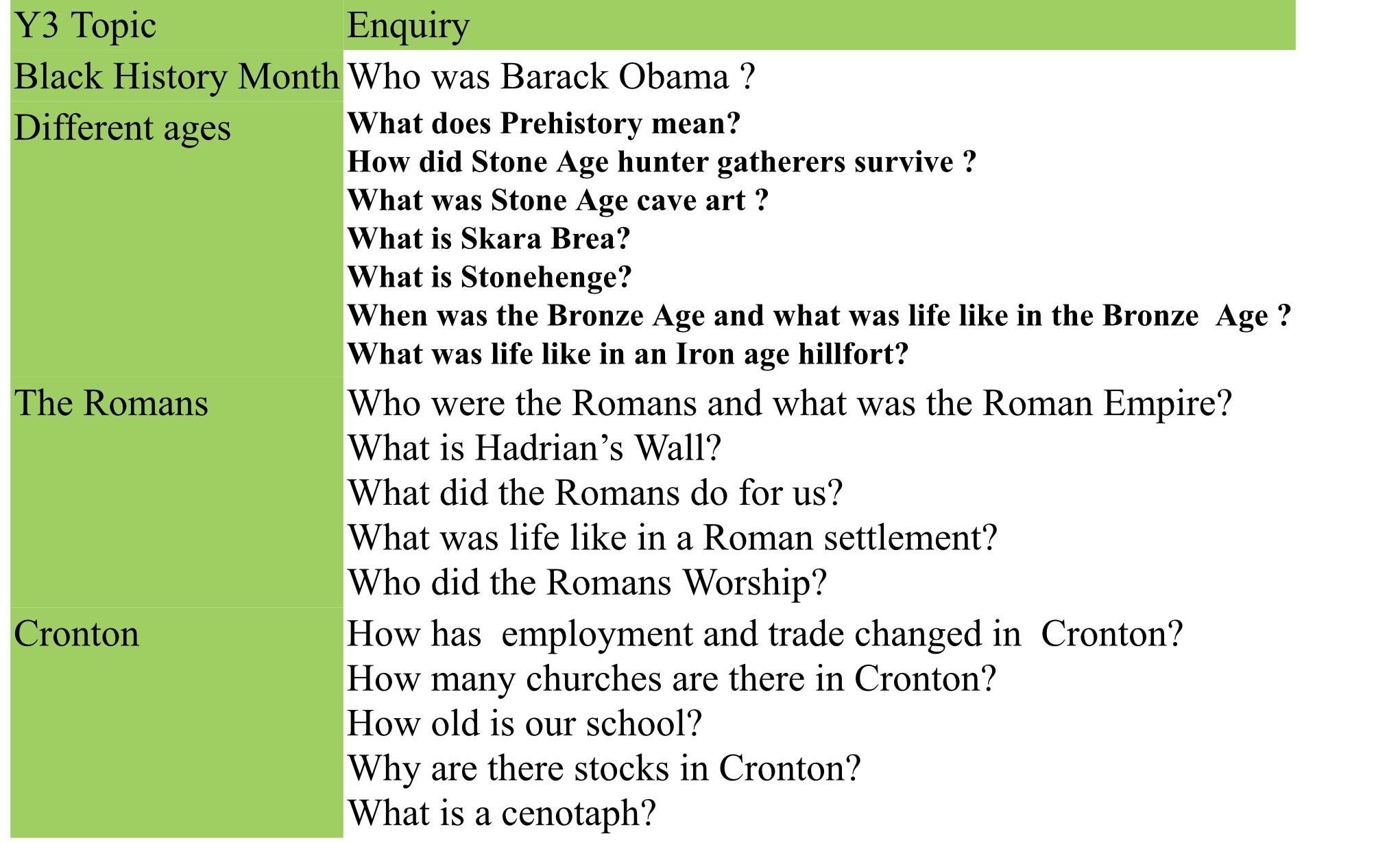
Year 4
As part of Black History Month children will learn about the life of Ruby Bridges and how her school life was very different to their own.
As well as learning about British History, children in Year 4 will start to develop their knowledge of world history. They begin by learning about the Ancient Greeks and discovering some of their many legacies on the world today. Children learn about daily life and worship in Ancient Greece and are able to compare this with their knowledge of the Romans. Children will read some of the many Greek myths and legends as well as having opportunity to write their own.
Children continue to develop their chronological knowledge of British History by learning about Anglo Saxon Britain. They will discover who the Anglo Saxons were and how we know so much about their life through the archaeological site of Sutton Hoo. Children will use artefacts to learn about daily life in Anglo Saxon Britain and find out about how some of our language today has links to this time. Children will be able to compare life in Anglo Saxon Britain to that of Roman Britain.
In the summer term children will build on their local history by moving onto discovering how the past is still reflected in our town of Widnes today through industry, sport and religion. Children will have the opportunity to deepen their knowledge of the Victorian era studied in Year 2 by learning about how the Victorian Widnes chemical industry was of national importance.
Year 5
As part of Black History Month in October children in year 5 will be taught about the life of Nelson Mandela and what he fought for.
They will continue to develop their knowledge of world history by finding out about life in Ancient Egypt. They will discover who the Ancient Egyptians were and how the River Nile was so important to Egyptian Life. They will learn about Egyptian religious practices and Gods, and will be able to compare these to who the Romans and Ancient Greeks worshipped. Children will learn about the earliest forms of written communication by finding out about the Rosetta Stone.
Children will continue their chronological knowledge of British History in the Spring Term through learning about the Vikings. They will discover where the Vikings came from and how they invaded and settled in England, including their raids on monasteries. Children will find out what Danelaw was and will learn about daily life and worship in a Viking settlement, and again have the opportunity to compare this to life in other previously studied periods.
In the Summer Term children will build upon their knowledge of Widnes taught in Year 4, by learning about the how crossing the River Mersey here has been and still is an important trade route. They will learn about how this has changed through time, by looking at the different bridges there have been across the Mersey.
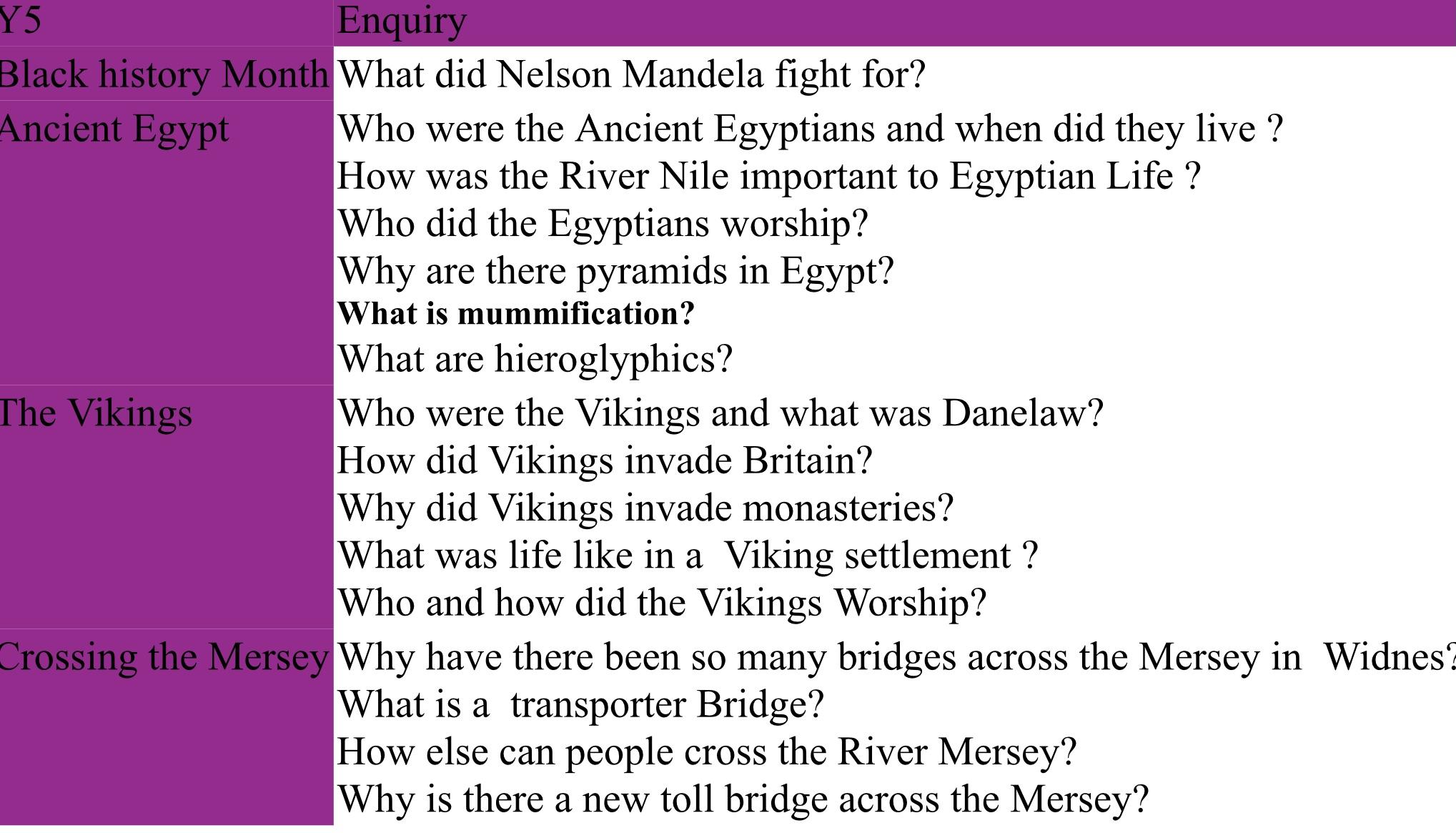
Year 6
As part of Black History Month Year 6 will learn about the life of Martin Luther King and compare it to Nelson Mandela’s, whom they learnt about in Year 5.
Children will continue to find out about significant periods of British History by learning about World War 1 and 2. During the topic ‘Britain at War’ children will look at the causes and end of both of the wars and some of the conditions and life during this time, including being in the trenches or an evacuee. They will learn about some of the important events from the wars including the Christmas truce in the trenches and the Battle of Britain.
In the Spring Term, to further develop their knowledge of world history, children in year 6 study the Mayan civilisation. They will learn where the Mayans lived and who they were. As this period of history is so vast and varied children’s learning will be based around life there circa 900AD. Children will compare and contrast such things as daily life, religious practices, written communication and cultural legacies with the other two ancient civilisations previously studied, that of Egypt and Greece.
In the Summer Term children in Year 6 continue to expand their historical knowledge of our local area by moving onto learning about our nearest city, Liverpool. They will find out about the slave trade and Liverpool’s role as a slave port. As their last historical topic at Cronton CE they will then have the opportunity to develop and combine all their research and presentation skills from previous years by carrying out their own research topic on an aspect of Liverpool’s history, developing their own question, researching it and presenting their findings.
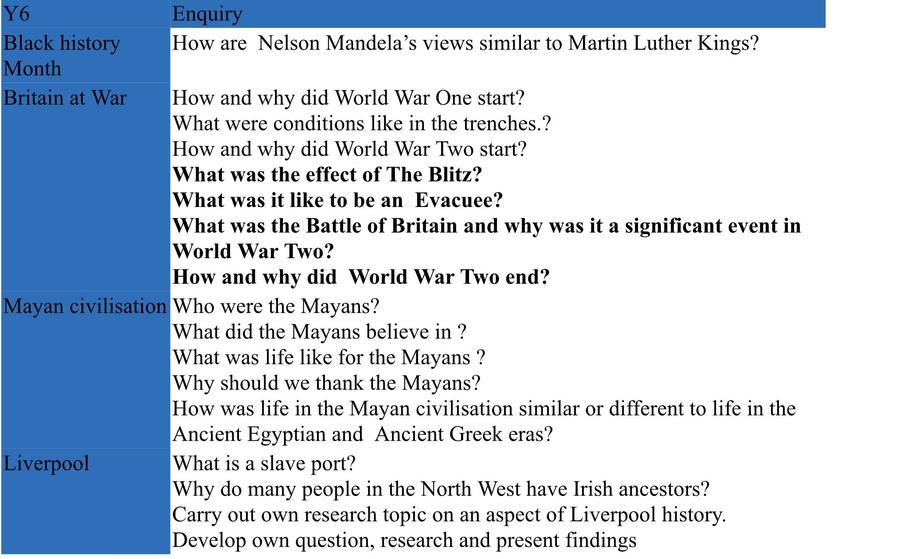
Impact
Impact will be measured through assessment throughout the history lessons and marking of books.
The impact of the history lesson will ensure that all children make good progress from their starting point and have the opportunity at working within the expected level and at greater depth. This will be shown at the end of each topic, by assessment tasks where progress and attainment can be shown.
Home Learning
Children may be asked to research a topic in advance or deepen knowledge. You can help at home by using our KEY learning sheets to reinforce learning. Children may use our homework helpers for suggestions and idea. If you are able to, visits to historical landmarks or museums may help your child make links, deepen their knowledge and understanding, spark curiosity and give opportunity to share their learning an knowledge with you. Many museums have online galleries too.


















